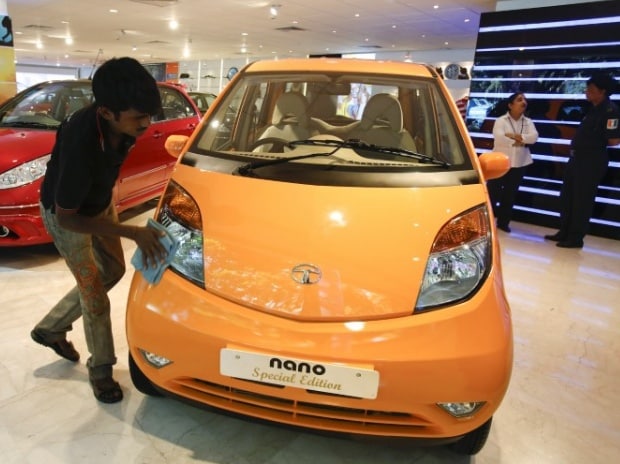Even as Nano continues to be a drag on Tata Motors, the company has no plans of phasing out the brand; instead the company is trying to reposition the affordable car.
Turning the car into an electric variant could be an option.
Recently, the company tested an electric variant of this car in Coimbatore which hasn’t been “commercially viable” although it passed the tests.
“We cannot phase out this car. Sentiments of the company, Ratan Tata and shareholders are attached to it. We are looking at how it can be repositioned”, Satish B. Borwankar, chief operating officer at Tata Motors said here on the sidelines of an event organized by the CII.
The Nano, which is produced from the company’s Sanand plant in Gujarat, shares the same production line with Tigor and Tiago – the latest models from the Tata Motors’ stable. However, faced with tepid demand for Nano and high demand for the other two models, the company has been focusing on rolling out the latest models from the production line.
Although Borwankar said that on an average, around 1,000 Nano cars are sold every month, the 2016-17 fiscal year was the worst for the world’s cheapest car as sales plummeted to only 7,591 units which is less than even the monthly volume made by Tiago and Tigor.
In June this year, Nano sales hit its lifetime low of only 167 units making the company seriously consider its repositioning.
Sources said since Nano debuted in the Indian market, it has been a drag on the company.
Borwankar stated that Tata Motors, which lost its hold in the passenger vehicles segment is headed towards staging a comeback in the coming 1-2 years. As Korean, Japanese, European and other players started flooding the Indian passenger vehicles (PV) market, Tata Motors’ which once was the third largest in the segment was pushed to the eighth spot in terms of sales.
“However, recently, we have managed to be the fifth largest in the passenger vehicles space in the next 1-2 years, we’ll again be the third largest”, he said.
As sales in the PV segment went on a steep decline, the company’s suppliers shifted to other players. Now, Tata Motors has initiated a step to have adequate suppliers for the PV segment.
Apart from this, top company executives are meeting the dealers individually to restore confidence.
The strategy to get back into the third spot will also involve introducing new models.
It is also expected that after terminating its agreement with Volkswagen, Tata Motors will be going alone to develop the advanced modular platform (AMP) which is designed to cut production costs and hence pave the way for cheaper cars.
“Personally, I think that there is enough talent in the company and we need not appoint consultants for it”, Borwankar said when asked about the future of the AMP project, adding that currently, the company isn’t on the lookout for new partners.
In early August, just four months after signing an agreement, the homegrown Tata Motors and Germany based Volkswagen called off the deal to develop cars for emerging markets together.
Tata Motors and Škoda Auto (part of Volkswagen) performed a joint technical feasibility and commercial evaluation of a potential collaboration. Based on discussions, the companies have concluded that the envisioned areas of partnership may not yield the desired synergies as originally assessed.
